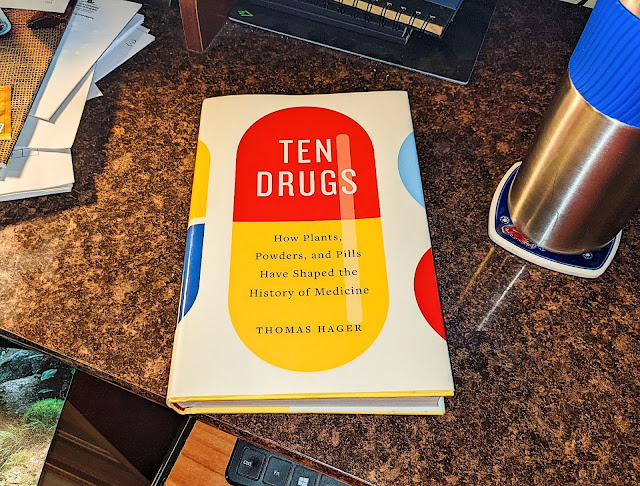
This book is popular science writing done well. It’s enjoyable, informative, almost compulsively readable, and leaves you wanting more. It has crisp, clear explanations of science and medicine, and a broad overview of the history of drug discovery and development.
Thomas Hager somehow accomplishes all this with very little jargon, which given the topic is an amazing feat. You come away with a good understanding of drug history and some sense of the important categories of drugs and drug discovery. And did I mention that it’s fun to read?
You can guess that I loved this book. It wasn’t a book I had heard much about, and I picked it up on a whim.
I hadn’t heard of the author before, either. Thomas Hager has a master’s degree in medical microbiology and immunology, but says he figured out that lab research wasn’t for him, and went back to school to get a master’s in journalism. That background makes him very well suited to write a book like this one.
Though the title implies he’ll cover ten drugs, he spends his ten chapters telling the history of classes of drugs. The first chapter does focus on opium, one of the first drugs for which we have documentation. It’s mentioned by Greek historians and in Homer’s Odyssey, where Helen makes a sleeping potion likely based on the sap of the opium poppy.
The remaining chapters take us through various drugs and treatments (he even covers vaccination) all the way up to today’s monoclonal antibodies. The Epilogue talks about where drug development may be headed from here. Along the way you learn about the popularity of “knock out” drugs in the 1920s, how heroin used to be marketed as a cough suppressant, how antibiotics were discovered, the miraculous impact of “mind drugs”, the cultural changes wrought by the Pill, and more.
One chapter discusses Big Pharma’s quest for a pain relieving pill without the addictive power of opium or its derivatives, the opiates. Unfortunately, every discovery they made proved to be more addictive than the one before it, leading to the opioid crisis of today.
As with most of popular science, there is a lot on Hager’s chosen topic that doesn’t get covered. This book is giving us the surface of a much larger ocean. Most notable for me in that regard is the lack of history of many of the companies that we collectively call “Big Pharma” today. I worked for a large health care manufacturer myself for a number of years. One of their products is mentioned in this book, but the name of the company doesn’t appear anywhere within it’s pages.
That doesn’t mean Hager doesn’t help us understand the rationale behind Big Pharma’s drive for new products. He spends a good part of his chapter on statins discussing the money-making nature of the drug business. There is a reason why we are marketed drugs that don’t cure a disease but instead manage symptoms, and the reason is money.
You will use a drug that cures disease only until you’re cured. A drug that manages symptoms is one you’ll take for a long period - even for the rest of your life. As Hager points out, there’s more money to be made from the lifelong drug than from the short use drug. It’s true that both types of drugs address needs we may have. The fact is though that curative drugs don’t get the research dollars as often because they don’t have the monetary return.
I found this book to be a very well told overview of the history of drug making and modern medicine. I give Ten Drugs Five Stars ⭐⭐⭐⭐⭐.
Steve's Book Stuff participates in affiliate programs for the booksellers asterisked below. Purchases you make through an affiliate link will return a small commission to me, at no additional cost to you. Thanks for your support, it helps me buy books to read and review!
Borrow or Purchase Ten Drugs here:
📙 Borrow this book: Find out if your library has the ebook or audiobook available through OverDrive or Libby.
📘 Buy this book: Amazon* | Barnes & Noble | Books-A-Million* | AbeBooks* | Powell’s | ThriftBooks
📗 Support Indie Bookstores: Buy this book directly from Bookshop.org* or find an Independent Bookstore near you*.
📚 Visit my Bookshop.org shop to see all my reviewed books.
Title: Ten Drugs: How Plants, Powders and Pills Have Shaped the History of Medicine
Author: Thomas Hager
Publish Date: March 5, 2019
ISBN-13: 9781419734403
Publisher’s List Price: $26.00 (Hardcover as of 01/2022)
